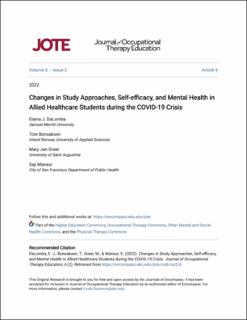Changes in study approaches, self-efficacy, and mental health in allied healthcare students during the COVID-19 crisis
Peer reviewed, Journal article
Published version
Permanent lenke
https://hdl.handle.net/11250/2994444Utgivelsesdato
2022Metadata
Vis full innførselSamlinger
Originalversjon
Journal of Occupational Therapy Education. 2022, 6 (2), 1-13.Sammendrag
There is growing concern about student mental health, particularly during the COVID-19 crisis. Mental
health factors impact self-efficacy and study behaviors, thus there is a need to explore changes in these
factors during the pandemic. The aim of this study was to explore changes in allied healthcare students’
approaches to studying, self-efficacy and positive mental health before and during the COVID-19 crisis.
The Approaches and Study Skills Inventory for Students, General Self-efficacy scale, Mental Health
Continuum – Short Form were given to graduate students (n=26) prior to, and one year into the pandemic.
Repeated measures analyses of variance were performed. General self-efficacy scores increased with
large effect size, while no significant change pattern was observed for mental health scores. The
decrease in strategic study approach scores had a large effect size. The changes in deep and surface
study approach scores across time were not statistically significant. While students sustained their
mental health and increased their self-efficacy, students may benefit from assistance in organizing daily
academic routines and fostering community support during times of crisis.

